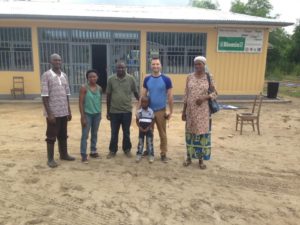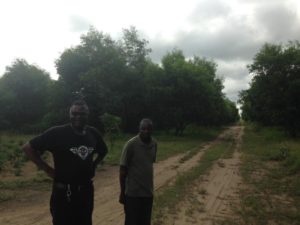
DRC’s abundant natural resources are not only to be found underground. Any new visitor to the country cannot fail to appreciate the land’s rich vegetation and fertile farmland. And yet despite its excellent soil and climatic conditions, DRC needs to import much of its food from neighbouring countries. The agricultural sector is perhaps another victim of the mineral resource curse. Intense focus on exploitation of precious commodities – the quest for Eldorado – has contributed to the lack of interest in developing the nation’s agricultural potential.
Having identified a national agricultural skills deficit, Université Loyola du Congo (ULC) has sought to create a centre of excellence for sustainability and food security. Instituted only last year, ULC is the world’s newest Jesuit university. Its Centre de Recherche et de Communication pour le Développement Durable (CERED), which is part of the University’s Faculté des sciences Agronomiques et vétérinaires, has developed a multidisciplinary programme for a diverse range of stakeholders that includes researchers, students, and local communities.
I travelled to ULC’s home in Kimwenza, a southern district of Kinshasa, to meet CERED’s director, Ghislain Tshikendwa Matadi SJ. Pére Ghislain’s vision is to develop a centre bringing together natural and social sciences, which puts the welfare of people at the core of its research and educational formation. As superior of a fledging community of Jesuit scholastics located on-site in ULC campus, his first mission is to conscientize young minds in the Society of Jesus in the mission of the Society including issues relating to sustainability. Having spent an evening with these impressive young Congolese Jesuits, who articulately explained the situation in DRC to me, I realise Pére Ghislain’s influence begins at home!

The next day I accompanied Ghislain to CERED’s agroforestry centre and agricultural training centre in Mongata, on the Batéké Plateau, 165km from Kinshasa. The Mongata project began a number of years ago when Pére Ghislain coordinated the planting of trees on 4200 hectares of savanna. The plantation which mostly consists of Acacia trees is now well established and is managed by local people. Mongata also acts as a meteorological station for measuring the impact of climate change, and has a bee-keeping project which draws on the techniques of local traditions and wisdom.
On the journey out of kinshasa, two things struck me powerfully. First was the dire state of the roads. Any driver must skilfully dodge enormous potholes, traverse mud-pits and small ponds, and carefully navigate around a plethora of broken down trucks. The vast revenues from the mining industry are clearly not finding their way into improvements for DRC’s basic infrastructure. The other thing the road trip made me painfully aware of was the relentless sliver of slum developments alongside the road, inhabited by a population existing in dire poverty and desperate for work.
Entering the peaceful countryside outside Mongata, I wondered why so many flee to the big cities from such a rural idil. Passing through villages however, I realised that the poverty of countryside-dwellers was just as acute as in Kinshasa. I noticed too that there was little evidence of agricultural infrastructure or employment.
When we arrived at Mongata in the early evening, a group of local farmers, which included the village chief, had gathered. They were here, apparently to welcome me, but also for formation session led by Ghislain and CERED staff member Emmanuel Mwanangulu. After a presentation on the idea of establishing a cooperative at Mongata to strengthen the position of the community in purchasing and selling, a lively discussion ensued in a mix of French and Lingala. A meal of maize, chicken and legumes followed, and the local men seemed happy to have the opportunity to chat with each other. Then they went off, mostly by foot, some by motorcycles.
My experience at Mongata called to mind the aspect of Laudato Si which encourages investment in local rural economies. Pére Ghislain’s work embodies the guidance and encouragement of Pope Francis when he says: New forms of cooperation and community organisation can be encouraged in order to defend the interests of small producers and preserve local ecosystems from destruction. Truly, much can be done! (para 180).

